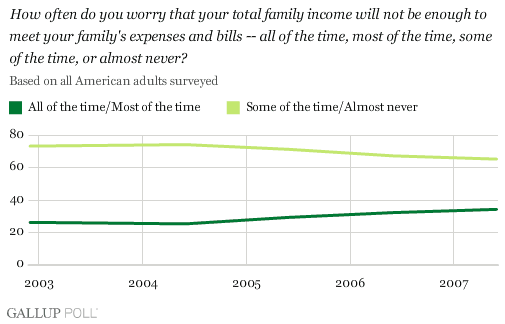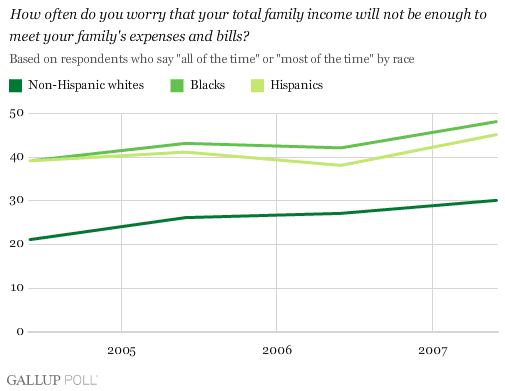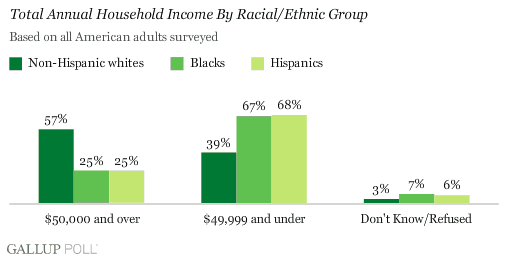PRINCETON, NJ -- According to Gallup's annual Minority Rights and Relations survey, more than one-third of U.S. adults often worry that their income won't be enough to cover their household's expenses, virtually unchanged since 2006. Black and Hispanic Americans report higher levels of worry than non-Hispanic whites do.
The survey conducted June 4-24, 2007, shows that 34% of Americans worry "all of the time" (21%) or "most of the time" (13%) that their total household income will be not be enough to meet their family's expenses and bills. The percentage of Americans worrying about this all or most of the time has varied since Gallup began measuring this trend 31 years ago, ranging from the lowest point, 21%, in 1998 to the highest point, 35%, in 1984. In annual measures since 2004, the percentage has gradually increased from 25% to 34% this year.

Forty-eight percent of blacks and 45% of Hispanics compared with 30% of non-Hispanic whites report worrying all or most of the time that their total income will not be enough to meet their family's expenses. Since Gallup started tracking the results of this question by race and ethnicity in 2004, the gap between non-Hispanic whites and either blacks or Hispanics has been at least 10 percentage points, and in some cases, it has stretched to 18 points.

Additionally, minorities are more likely than whites to say they always worry about this issue. Thirty-three percent of blacks and 27% of Hispanics compared with 18% of non-Hispanic whites say they worry all of the time that their total family income will not be enough to meet their family's expenses. With the exception of 2006 when the gap between whites and both blacks and Hispanics narrowed, Gallup has observed this pattern of greater worry as reported by U.S. minorities since 2004.
The greater financial concern expressed by blacks and Hispanics corresponds with their much lower household income levels, relative to the income of whites. Whereas 57% of non-Hispanic whites have household incomes of $50,000 or more (generally exceeding the U.S. median income level), approximately two-thirds of blacks (67%) and Hispanics (68%) have annual household incomes below $50,000.

Bottom Line
While the poll reveals that a significant percentage of Americans worry about their cash flow, it also shows that minorities are more likely than whites to report having such concerns. In some cases, living above one's means could cause Americans to worry about their ability to pay their bills. But most likely, those who worry simply have less cash to cover their household's basic expenses such as food, housing expenses, utilities, and auto expenses. In light of the impact that financial anxiety can have on domestic relationships, mental health, and even physical health, closing the income gap among whites, blacks, and Hispanics could also be beneficial in achieving parity on a number of other well-being dimensions.
Survey Methods
Results are based on telephone interviews with 2,388 national adults, aged 18 and older, conducted June 4-24, 2007, including oversamples of blacks and Hispanics that are weighted to reflect their proportions in the general population. For results based on the total sample of national adults, one can say with 95% confidence that the maximum margin of sampling error is ±5 percentage points.
For results based on the sample of 868 non-Hispanic whites, the maximum margin of sampling error is ±7 percentage points.
For results based on the sample of 802 blacks, the maximum margin of sampling error is ±6 percentage points.
For results based on the sample of 502 Hispanics, the maximum margin of sampling error is ±6 percentage points. (138 out of the 502 interviews with Hispanics were conducted in Spanish.)
